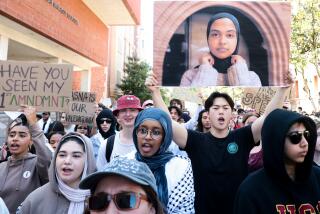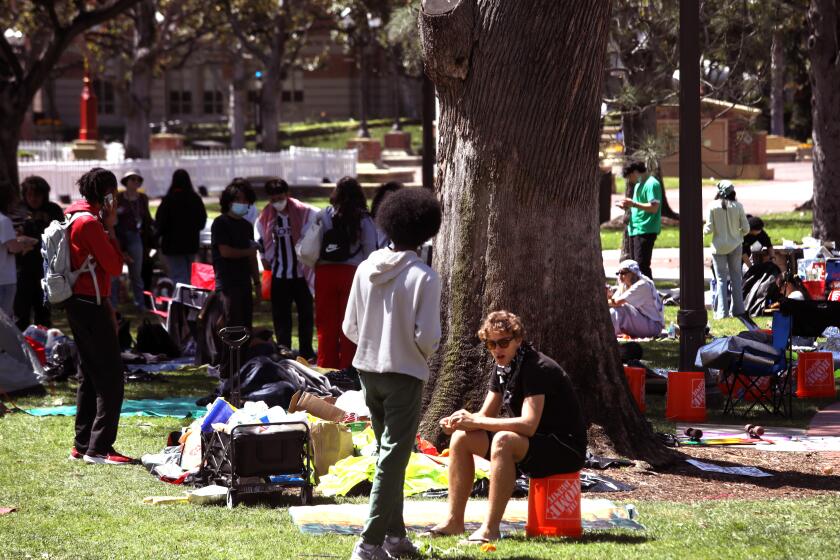District’s Runaround Pushes Teacher to Limit
Sure it seems odd to be eating spicy chicken wings and discussing Aristotle with a young Muslim who thinks she’s on the U.S. government’s terrorist watch list, especially while hanging out with a bunch of high school teachers at Hooters. But then everything about Simone Shah’s almost yearlong effort to return to teaching in Los Angeles has had a “Through the Looking Glass” quality.
I began talking to Shah in March. By then she’d already spent weeks calling and pounding out e-mails, pleading with L.A. Unified officials to let her get back in front of classes at Locke High School, near Watts.
That Shah was willing to tell me her story may have something to do with why there is a story. Schools, after all, can be as insular as a SWAT team, and Shah has a journalist’s aversion to keeping things quiet.
But Shah isn’t a journalist. Not really, despite a couple of detours into that trade. What she seems to be is a born teacher.
Not that Shah paints herself as the Exalted Perfect Goddess of Educational Awesomeness. When we first talked at the big, beat-up Pico-Union-area Victorian she’s restoring, she thought back to her first semester and grimaced. Fresh out of college, she had strutted into her history and art classes with only an emergency credential and the naive enthusiasm of a liberal do-gooder.
Shah’s students at Locke hadn’t had a permanent teacher or classroom in months. They were, she said, accustomed to throwing things and brawling in the hallways. “I felt horrible. Every day after my class the room was, like, destroyed.... I couldn’t even keep them in line to take attendance.”
Lots of teachers bail after their first year. Others learn to live with being lousy. Many, like Shah, begin to see students as “the enemy.”
But Shah couldn’t reconcile that feeling with the love she’d felt for the poor, tough, East Palo Alto kids she’d tutored a year earlier as an undergraduate at Stanford. So she cajoled veteran teachers she admired into critiquing her in the classroom and began to adapt her methods.
“I learned,” she said, “that you have to start with a lot of structure.”
She got good, other teachers say. Students voted her one of their favorite Locke teachers.
Meanwhile, Shah’s parents, natives of India, were embarrassed by their daughter’s passion for teaching. They nagged her to do something they considered more prestigious -- doctoring, lawyering, running a 7-Eleven.
She resisted. But they’d worn her down enough that after Sept. 11, 2001, she thought she glimpsed a higher calling. She would become a broadcast journalist and teach millions of Americans about history and Islam.
Shah thrived in the entry-level television jobs that followed a master’s in journalism from Columbia University (in their evaluations of her, bosses and professors gush). But Shah couldn’t stop thinking about Locke. The calls from parents grateful to have someone pushing their kids. Treats they’d send to class because they thought Ms. Shah was too skinny. The students who still called to thank her for her enthusiasm and for taking extra time with them.
“Ever since I left,” she said, “it’s been a gnawing feeling that I’m not doing what I was meant to do.”
Shah recognizes that she had annoyed some teachers and administrators by speaking up about problems on campus and with her off-campus activism in support of equal funding for low-income schools and against what she saw as an obsession with testing.
But Shah heard that Locke’s energetic new principal had no patience for the culture of mediocrity that can infiltrate any institution. She started pushing through the paperwork to get the credential she’d earned at UCLA and applied to the district in November, naming Locke as her preferred assignment.
Maybe this request befuddled a bureaucracy accustomed to teachers who beg to teach anywhere but the inner city. Or maybe, Shah suspects, Locke’s internal politics had percolated up through the web of quid-pro-quo relationships that infect any sprawling institution. In any case, when they finally responded to her pleas, the district’s hiring and placement people told her she could teach anywhere but Locke, Shah says.
District administrators said they couldn’t discuss Shah’s case even though she gave them permission to do so. Frank Wells, that energetic new principal, said he asked around and found teachers who offered high praise for Shah. Others told him, “Bad news.” He said it doesn’t bother him that Shah rubbed a few colleagues wrong. “I was convinced of her heart and soul.”
This was on St. Patrick’s Day. He told me he hoped to have Shah teaching at Locke within a couple of weeks. By the end of the semester, Shah had given up and was working her way back into journalism with some freelance work, and Wells stopped returning my calls.
Shah’s story didn’t end there, though. In August, Wells offered her a job teaching world history at Locke. A few days before school started, she went in and spruced up her classroom for the 200 or so students who would move through it over five periods.
During the first weeks of school, Shah sounded ebullient as she talked about engaging students even in overcrowded classrooms. She begged friends for spare laptops to give students and bragged about their first drafts of essays on their views of Utopia as informed by Plato and Aristotle.
Before long, though, she called me and, with a sigh of weary bewilderment, said she had just been told she wasn’t on the payroll. Her contract hadn’t been finalized because the FBI was slow to process her fingerprint check -- that watch list thing, she suspects.
Livid though she was that the district hadn’t foreseen this glitch -- especially after all she’d been through to get hired -- Shah decided to keep working without pay. “At least the kids will have a teacher.”
On Sept. 30, however, an administrator arrived in her classroom and told her that attendance was lower than expected, that she and a number of other teachers were being “displaced” from Locke and should await reassignment.
Shah had several discussions with district personnel that left her feeling “powerless, frustrated and angry -- I almost feel like that place makes a sane person go crazy.”
Last week, with her fingerprints finally cleared and assurances that she’d receive back pay, she turned down the district’s offer to teach junior high. “I’m throwing in the towel,” she said.
I don’t know who’s responsible for Shah not teaching in the troubled school of her dreams. I have met good people in the district’s teacher recruitment department, and they sure seem to work hard to get great teachers into bad schools in spite of new hurdles thrown up by federal No Child Left Behind rules. And even Shah acknowledges that she could have been more coolheaded and professional with the people who had such power over her.
Still, it seems like a waste if politics or hotheadedness deprived students of an inspiring teacher. Way back in March, on an impromptu tour of the school, the principal offered this quick estimate of the school’s 181 teachers: Some 30, he said, need remedial instruction and seven should never have been allowed to put marker to whiteboard. Then there were the long-term subs.
A few days after Shah’s last day, five energetic, clearly dedicated young Locke teachers dragged Shah to Pasadena’s Hooters (don’t ask me). Over beer and wings, they lamented that someone so committed to teaching and the school had been shoved out while uninvolved and incompetent teachers remained on staff.
For her part, Shah had not yet fully grasped that she was no longer a part of this ad hoc school reform movement. It was disheartening to hear her chatter excitedly in the present tense about the joys of helping students understand Aristotle and Utopia.
*
Are good teachers hard to find? Discuss that question or this column at latimes.com/schoolme. Bob Sipchen can be reached at bob.sipchen@latimes.com.
More to Read
Start your day right
Sign up for Essential California for news, features and recommendations from the L.A. Times and beyond in your inbox six days a week.
You may occasionally receive promotional content from the Los Angeles Times.






